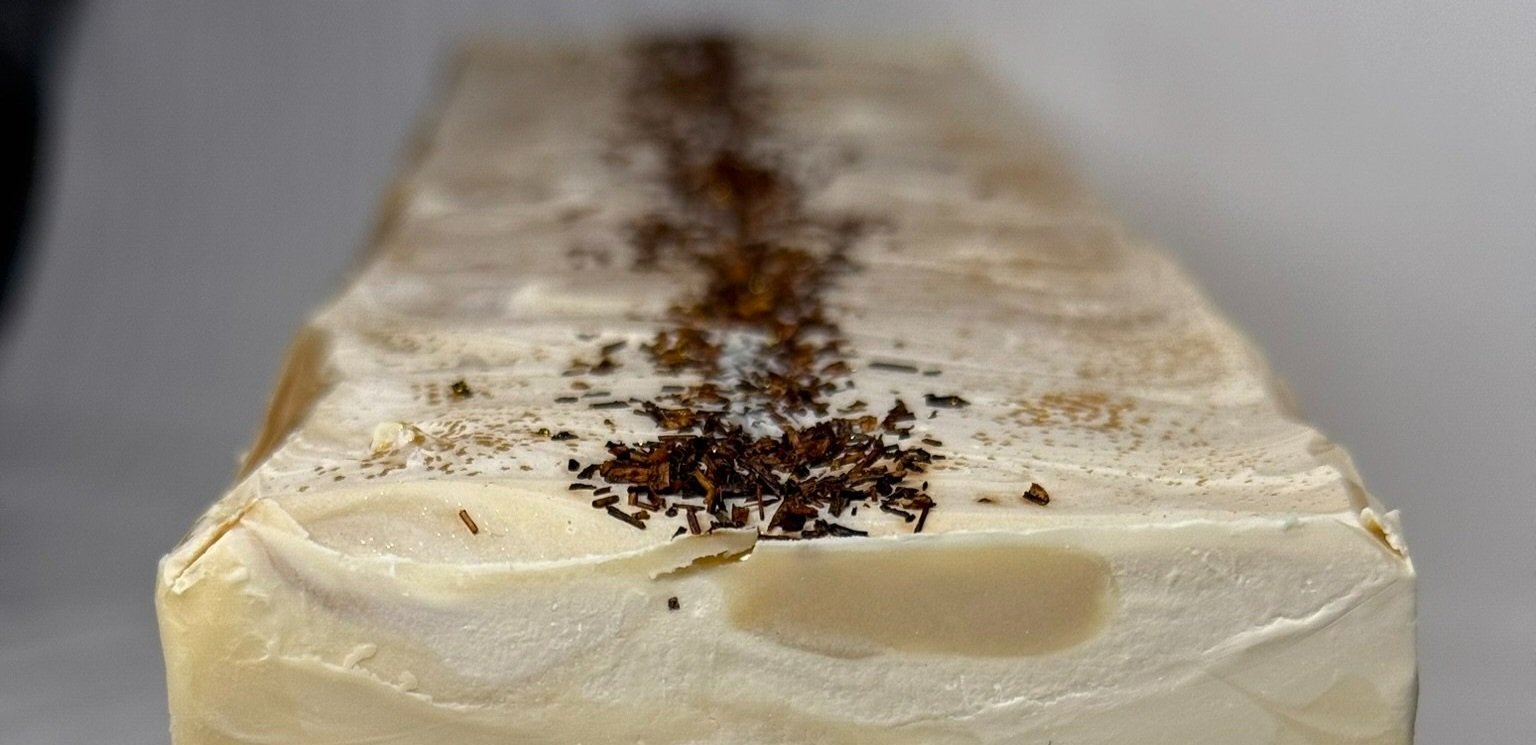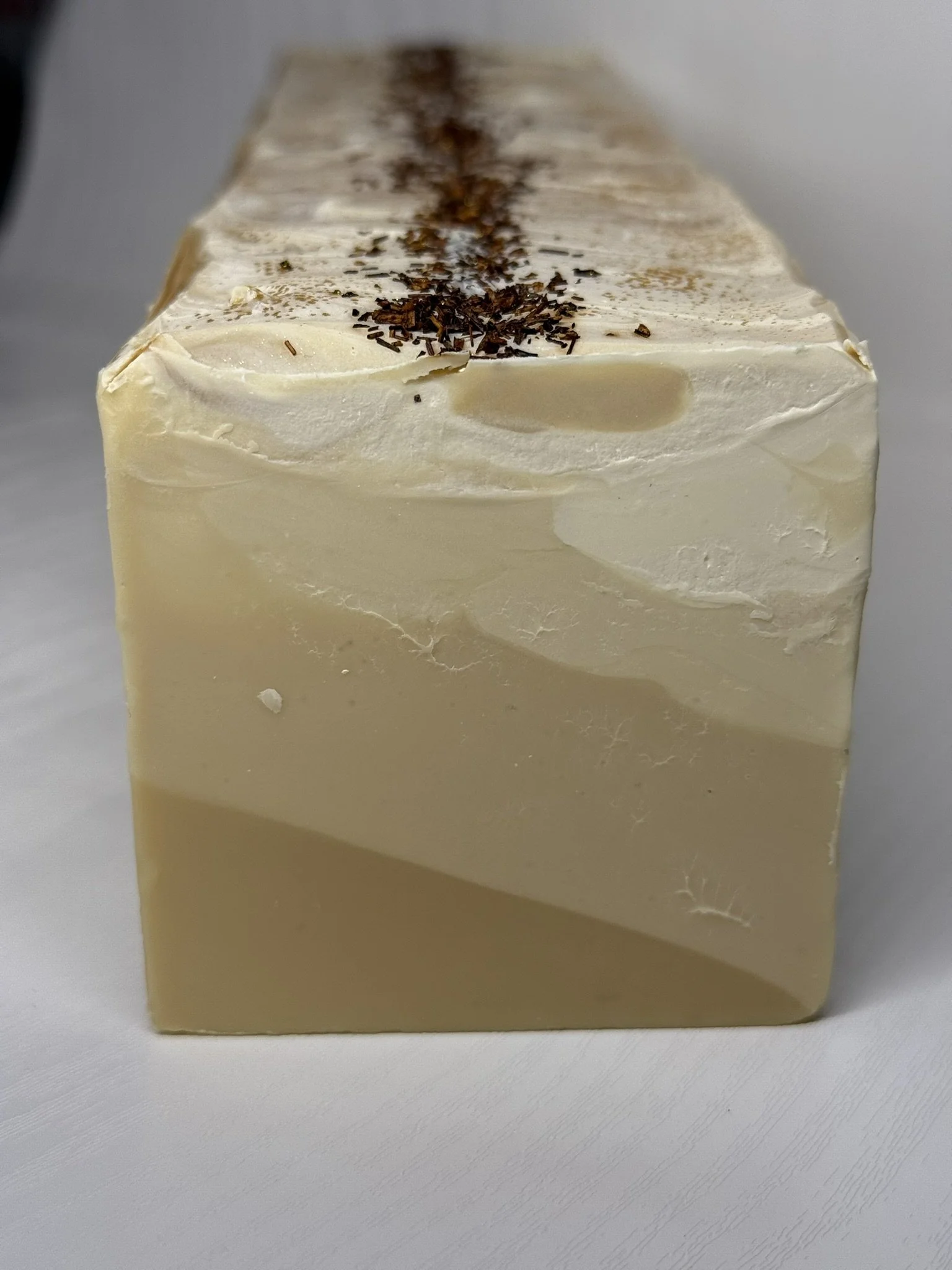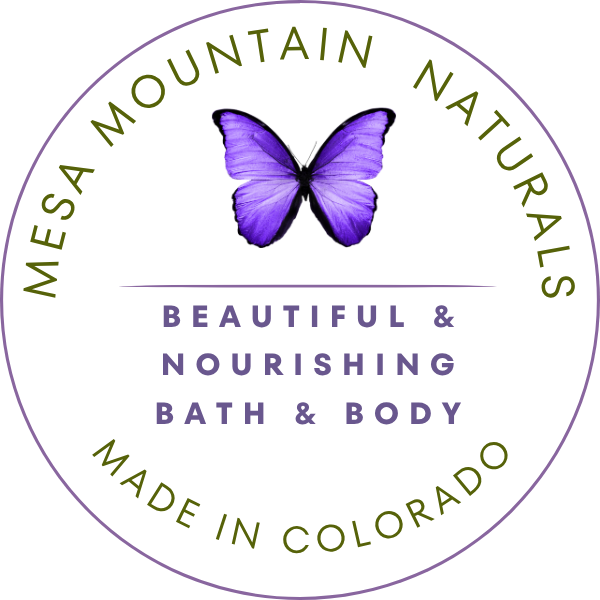

Ingredients & Information
At Mesa Mountain Naturals, we care about making soap that is nourishing and gentle. Our goal is to be as transparent as possible about our ingredients.
One question is whether our products are 100% natural.
The answer is, mostly! We do offer soaps that are crafted with 100% natural ingredients including natural colorants and essential oils, or that are unscented. You can filter for our “All Natural” category on our Shop webpage.
Many of our soap varieties are made with high quality fragrance oils that are technically synthetic due to being created in a lab. However, we only use those that are created specifically for safe use in bath and body products as a wash-off product that does not stay on the skin like lotions, creams, and makeup.
Why do we use fragrance oils and mica?
Soap-making is a rigorous and volatile alchemical process known as Saponification. While 100% pure essential oils are preferred, their use can be significantly more costly and present as an unstable fragrance source. Furthermore, it can take a lot of essential oil to maintain fragrance. To keep our bath and body products affordable, we use fragrance oils and/or essential oils. - And, mica (a mineral colorant) is how we create beautiful and stable color designs. Please keep in mind that if you use any makeup at all, they likely contain mica as the colorant, which is considered non-toxic. The good news is, fragrance oil and micas comprise less than 3% of each soap bar we create and are known to wash off during proper rinsing.
Along with fragrance oils and mica, we use the following ingredients:
Oils and nut butters made from quality ingredients,
Natural herbs, flowers, spices, teas, puréed fruits, citrus peel, oatmeal, honey, and goat’s milk. Many of these provide natural color, scents, or skin-soothing properties,
Clays: Kaolin clay for conditioning and deep pore-cleansing,
Salt and sugar: Cane sugar increases bubbles. Salt (or sodium) creates a harder bar and can be used for exfoliation.
Soap conditioners such as citric acid to prevent color bleed or sodium lactate to harden bars,
All soap requires the use of sodium hydroxide (also known as lye). Sodium hydroxide is necessary to turn oils into soap, a process known as saponification. True soap cannot be made without it. The good thing is - it's not present in the final, finished soap product.
Below is a glossary of ingredients that may be present in our bath and body products.
*All ingredients are listed on individually sold products.
Fragrances (Aromatherapy)
Essential Oils
Essential oils are highly concentrated natural extracts derived from various parts of plants, including leaves, flowers, stems, and roots. These oils capture the plant's scent and flavor, also known as its essence. The extraction process can involve methods such as steam distillation, cold pressing, or solvent extraction. For this reason, essential oils can be significantly more costly and an unstable source of fragrance when it comes to soap making.
Botanical Infused Oils
Oils infused with herbs, spices, and other botanicals. These are created in my soap studio to provide the most natural scents possible. They include oils infused with rosemary, chamomile, lavender, turmeric, calendula, mint, teas, and citrus peel (lemons and oranges). These infusions are seeped in olive oil or sunflower over a period no less than 8 weeks.
Infused oils provide a subtle, natural, and low cost alternative to essential oils and fragrance oils but lack the full strength of scent. Along with infusing their subtle scent, herbs and other botanicals provide soothing benefits to skin.
Fragrance Oils
Fragrance oils are commonly used in soaps. Since soap is used externally for a limited amount of time then washed away, fragrance oils are generally accepted as non-toxic and skin-safe unlike products designed for long wear (e.g. lotions and creams). I use fragrance oils from Nature’s Garden, which are are concentrated scent blends carefully formulated using natural and synthetic ingredients. Even though fragrance oils contain natural components, they are classified as synthetic due to the presence of lab-created elements. This blend of nature and science makes them an excellent choice for crafting soaps and other products that require complex, stable, and consistently performing scents.
What’s Inside Fragrance Oils?
Essential Oils: Extracted from plants using methods like steam distillation or cold pressing, these provide naturally derived scents.
Synthetic Aroma Compounds: Lab-created ingredients that mimic natural fragrances or introduce new, unique scents not found in nature.
Solvents and Diluents: They help maintain the liquid consistency of fragrance oils, allowing them to mix easily with different products.
*These fragrance oils are paraben-free and phthalate-free and non-toxic.
Disclaimer: If you are sensitive to fragrances or have any concerns about synthetic blends, choose unscented or 100% natural bath products by filtering these options on our Shop webpage.
Oils and Butters (Moisturizing)
Almond Oil
Almond oil offers various benefits for the skin, including moisturizing, soothing inflammation, and potentially reducing the appearance of scars and stretch marks. It's rich in vitamin E, which has antioxidant properties, and can help protect the skin from sun damage and free radical damage.
Moisturizing and Hydration: Almond oil's emollient properties help to hydrate and soften the skin, making it a good choice for dry or flaky skin. It can restore the skin's moisture barrier and prevent water loss.
Anti-inflammatory and Soothing Properties: Almond oil can soothe irritated skin and reduce redness, making it helpful for conditions like eczema and rosacea.
CASTOR OIL
Castor oil, derived from the seeds of the castor plant, is famed for its potent skin benefits. It is rich in ricinoleic acid, a fatty acid with remarkable anti-inflammatory properties that can soothe irritated skin and reduce redness. When used in soap or beauty products, Castor Oil can be an excellent moisturizer, providing deep hydration and helping to restore the skin's natural moisture balance.
Another notable benefit of castor oil is its efficacy in treating acne. Its antibacterial properties can help eliminate acne-causing bacteria, while its anti-inflammatory effects can reduce the swelling and redness associated with breakouts.
Castor oil is packed with antioxidants that help combat free radicals, which are responsible for premature aging. It supports the skin's overall health and vitality, making it an excellent choice for those seeking to maintain a youthful complexion.
Whether used alone or incorporated into skincare products, castor oil stands out as a powerhouse ingredient for nurturing and enhancing the skin's natural beauty.
BATANA OIL
Batana oil offers numerous benefits for both hair and skin, including promoting hair growth, moisturizing, reducing frizz, and improving skin elasticity. It can also help with scalp health, reduce inflammation, and provide gentle exfoliation. In soap, it can help provide deep, long-lasting hydration, making it ideal for dry, dull, or irritated skin. It provides gentle exfoliation and moisturizing properties can help soothe irritated or inflamed skin.
Batana oil is rich in linoleic and oleic acids, it can help improve skin elasticity and reduce the appearance of wrinkles. It contains antioxidants that can help protect the skin from free radical damage, potentially slowing down the aging process.
BEEF TALLOW
Beef tallow is sourced from cows. The tallow used in our products is food-grade and non-GMO.
Tallow and lard are ingredients used in traditional soap-making. It offers several skin benefits including nourishing, moisturizing, and soothing irritated skin. Beef tallow contains vitamins A, D, E, and K, and other essential fatty acids. It is gentle in nature, making it suitable for people with sensitive or dry skin. Tallow is said to help maintain the skin's natural moisture barrier. It is generally considered non-comedogenic (doesn't clog pores) but is not recommended if you have acne-prone skin. Tallow soap combined with activated charcoal may help prevent breakouts.
Beef tallow soap produces a rich, creamy lather that cleanses effectively without excessive dryness. It has anti-aging properties that can help reduce the signs of aging by supporting skin elasticity.
COCOA BUTTER
Cocoa butter is hailed for its rich moisturizing qualities. Extracted from cocoa beans, this natural fat is packed with essential nutrients to nourish and rejuvenate the skin. High in fatty acids, cocoa butter provides intense hydration, making it a superb remedy for dry and cracked skin. Its gentle nature makes it suitable for all skin types, including sensitive skin. Its anti-inflammatory properties aid in soothing and calming irritated skin, making it beneficial for conditions like eczema and psoriasis.
Cocoa butter is also rich in antioxidants, such as vitamin E, which protect the skin from environmental stressors and free radicals that contribute to premature aging.
Soap with cocoa butter can lend to softer, smoother, and more radiant-looking skin.
COCONUT OIL
Coconut oil has long been cherished for its versatility and numerous health benefits, particularly for the skin. Extracted from the meat of mature coconuts, this oil is packed with nutrients that nourish and protect the skin, making it a staple in natural skincare routines.
Coconut oil is renowned for its ability to provide deep and lasting hydration. Its fatty acids, such as lauric acid, caprylic acid, and capric acid, penetrate the skin effectively, locking in moisture and creating a protective barrier. This makes it particularly beneficial for those with dry or flaky skin.
The anti-inflammatory properties of coconut oil help soothe irritated and inflamed skin. It can alleviate symptoms of conditions such as eczema, psoriasis, and dermatitis. Its gentle nature makes it suitable for sensitive skin, providing relief without causing further irritation.
Coconut oil possesses natural antimicrobial and antifungal properties, thanks to its high lauric acid content. It can help combat bacterial and fungal infections, promoting healthier skin. This makes it an excellent choice for treating minor cuts, scrapes, and skin infections.
Rich in antioxidants, coconut oil helps fight free radicals that contribute to premature aging. Its nourishing compounds support skin elasticity, reducing the appearance of fine lines and wrinkles. Regular use can result in smoother, more youthful-looking skin.
JOJOBA OIL
Jojoba oil offers several benefits when added to soap, including enhanced moisturizing, gentle cleansing, and improved stability. It also helps with skin conditions like acne and eczema. Jojoba oil's unique structure mimics the skin's natural oils, allowing it to penetrate deeply and moisturize without being greasy.
Jojoba oil's molecular structure is similar to the skin's natural oils making it an effective moisturizer. It can help with acne and eczema due to its anti-inflammatory and antioxidant properties. Jojoba oil is generally considered non-allergenic.
MANGO BUTTER
Mango Butter is an excellent moisturizer for all skin types, especially mature, dry or sun-damaged skin. I tis non-comedogenic (does not clog poors) and can help provide relief from the dryness of eczema and psoriasis. In hair care, mango butter replaces moisture, adds softness, elasticity and shine to your hair.
OLIVE OIL
Olive oil offers several benefits for the skin, primarily due to its moisturizing, anti-inflammatory, and antioxidant properties. It can help reduce inflammation, promote wound healing, and protect against environmental damage. Additionally, olive oil can act as a natural moisturizer, helping to lock in moisture and improve skin texture.
PALM OIL (SUSTAINABLE)
Palm Oil is also known as Palm Fruit Oil. It creates a nice hard bar that lathers well, cleans, moisturizes, and conditions skin.
ROSEHIP OIL
Rosehip oil in soap refers to rosehip seed oil, which is extracted from the seeds of rosehip fruits. This oil is incorporated into soap for its moisturizing and skin-regenerating properties. Rosehip oil is rich in essential fatty acids, vitamins, and antioxidants, making it beneficial for skin health.
SHEA BUTTER
Shea Butter is a fat extracted from the nut of the Shea Tree. It is a favorite ingredient for providing luxurious creamy feel. It is excellent for dry, damaged, and maturing skin. Shea butter contains vitamins A and E, which have antioxidant properties and can help to protect the skin. Some people use shea butter soap to soothe burns and relieve irritated skin.
SUNFLOWER OIL
Sunflower Oil is made from the Sunflower plant and seeds. Once saponified, it creates a luxurious soap bar that can be used on all skin types, including sensitive skin. It is said to be one of the most moisturizing vegetable oils. Rich in linoleic acid, Sunflower oil can leave the skin feeling soft and conditioned.
Conditioning Additives
GOAT’S MILK
A wonderfully gentle and nourishing ingredient that provides several remarkable benefits for the skin. It is rich in fatty acids, which work to help maintain the skin's natural moisture barrier, keeping it hydrated and healthy. Additionally, goat milk contains lactic acid, which contributes to gentle exfoliation, helping to remove dead skin cells without irritating the skin. Furthermore, goat milk is well-known for its excellent moisturizing properties, leaving your skin feeling irresistibly soft and smooth, making it an ideal choice for all skin types.
HONEY
Honey is often added to soap for its wonderful natural moisturizing and humectant properties, which help the skin retain essential moisture. This delightful ingredient also contributes to creating a richer, more creamy lather that enhances the overall bathing experience and can impart a subtle, sweet scent that lingers gently on the skin. Additionally, honey can have antibacterial and anti-inflammatory benefits, making it a particularly beneficial ingredient for certain skin types, especially for those prone to irritation or breakouts.
KAOLIN CLAY
Kaolin is a mild and pure form off all-natural clay made from natural minerals. It gently cleanses and exfoliates, helping to remove dirt, impurities, and excess oil without drying the skin. Kaolin clay also helps to absorb excess oil and can soothe irritated or inflamed skin, making it suitable for various skin types, including sensitive and dry skin.
KOJIC ACID
Kojic acid powder is primarily used in skincare for its skin-lightening and antioxidant properties. It inhibits melanin production, helping to reduce hyperpigmentation, dark spots, and sun damage. It also has some antimicrobial properties and can be found in various cosmetic products like creams, lotions, serums, and soaps.
OATMEAL
Oatmeal or colloidal oatmeal is known for the following benefits:
Helps soothe irritated or sensitive skin, reducing redness and inflammation.
Acts as a natural humectant, helping to retain moisture in the skin, leaving it soft and hydrated.
Works as natural cleanser that contains saponins, cleansing agents that help remove dirt and excess oil from the skin.
Gently exfoliates the skin, removing dead skin cells and revealing smoother, brighter skin.
ROOIBOS TEA (RED TEA)
Rooibos tea is used both as a skin conditioner and natural colorant. It has a natural, earthy color that can be incorporated into the soap's appearance. Additionally, rooibos tea is believed to have soothing effects, potentially reducing irritation and redness, and may even help with skin conditions like eczema and acne
Rooibos tea is added as a brewed tea infusion or as dried leaves for an aesthetic look.
Other Additives
CITRIC ACID
Citric acid acts as a chelating agent that can help prevent soap color bleed, improve lather, and balance the soap's pH, making it gentler on the skin.
MICA
Unprocessed mica occurs naturally from the minerals known as muscovite, and silica. Mica combined with dyes or natural colorants are commonly used in cosmetics and soaps. Our products are made with dyed micas that have been specifically tested for use in bath and body products and are considered non-toxic and skin-safe.
SODIUM COCOATE
Sodium cocoate is a sodium salt of fatty acids derived from coconut oil. It's commonly used as a surfactant in soaps and cleansers, acting as a cleansing and emulsifying agent. It's created through saponification, the process of reacting coconut oil with sodium hydroxide (lye), which is the traditional method of soap making.
SODIUM HYDROXIDE
Sodium hydroxide, also known as lye, is a crucial ingredient in soap making because it's essential for the chemical reaction called saponification, which transforms fats and oils into soap. While lye is needed during the soap-making process, it's not present in the final, finished soap product.
SODIUM LACTATE
Sodium lactate is a common additive in soap making, primarily used to help bar soaps harden and last longer in the shower. It's a natural humectant, meaning it helps retain moisture, contributing to a firmer and longer-lasting soap bar. It also facilitates easier unmolding of cold-process soap.
SODIUM MYRISTATE
Sodium myristate can be derived from natural sources. It is the sodium salt of myristic acid, which is a naturally occurring fatty acid found in animal and vegetable fats and oils, like coconut and palm oil. It is created through the chemical reaction with sodium hydroxide, the ingredients needed for saponification.
SODIUM STEARATE
Sodium stearate is a common ingredient in soap, particularly in bar soaps, where it acts as a cleansing agent and helps create the solid, bar-like texture. It's the sodium salt of stearic acid, a fatty acid found in both animal and vegetable fats and oils. In soap-making, sodium stearate is created through the saponification process, where stearic acid reacts with sodium hydroxide.
